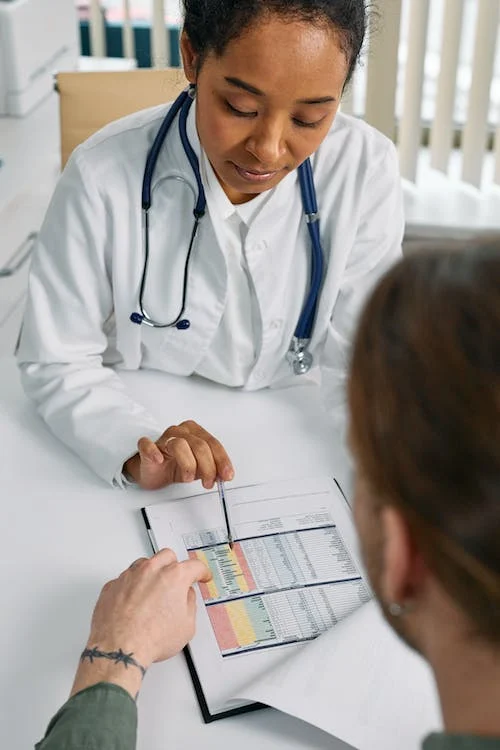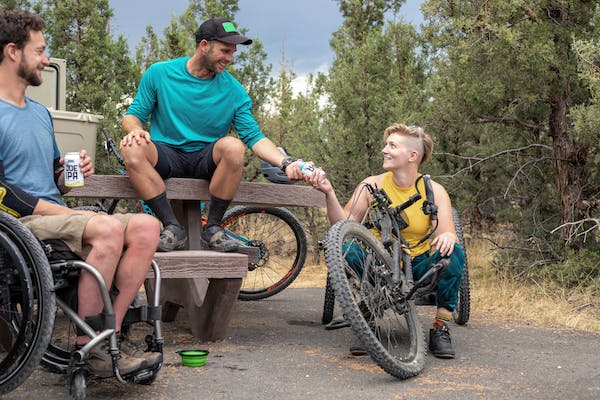
Trusting medical professionals
In a recent blog I concluded that I was going to try some new medication with the support of my GP – sounds sensible and simple doesn’t it?!
Unfortunately, my relationships with medical professionals isn’t straight forward!
I’ve had mental health problems for over 20 years and my physical body has been letting me down lately too:
- The first time I went to my GP (admittedly this was in the 90s) I wasn’t referred for the support I needed.
- The psychiatrist I was under for my first hospital admission (2005) mis-managed my case so badly I nearly died.
- Bed bound in hospital with a fractured spine I contracted MRSA (to be clear, I could not get up and about to go and find MRSA for myself, I was given MRSA).
- Discriminatory treatment in A&E following self harm. Eg longer waiting times and derogatory comments. (Some may think I deserved this and I agreed at the time but self harm is a symptom of mental illness just like hypoglycaemia is a symptom of diabetes.)
- Ceasing of therapy with no explanation despite good relationship with therapist
- When I’ve tried to raise concerns about my care, my version of events has been discounted.
- Abnormal blood results have been missed. Only picked up 10 months later, when I was seeing the GP about something else. I was still really struggling with the problem from 10 months previous but why would you go back when you’d be told there was nothing wrong?
- I came out of a consultation with a psychiatrist, having told him I was actively suicidal, with no plan to keep me safe. As far as he was concerned I was going to go home and take an overdose (of enough medication to end my life).
- For years I was told my tiredness was due to me not eating enough. When they finally did some blood tests, they found I had an underactive thyroid.
- During a phone consultation with my GP, I was incredibly distressed (crying so much I could hardly talk) and the doctor made no reference to it. I tend to hide my distress very well, the fact I couldn’t was an alarming sign I was very unwell.
- 3 incredibly painful cervical screening tests (I was told it was normal because it was my anatomy that was difficult) when I’ve since discovered, if they used a small speculum it can be completely pain free (twice!)!
- My GP “reviews” my repeat prescription without seeing me (for medications that require annual blood tests…). This happened multiple years in a row.
- Following an ankle operation my physiotherapist insisted the exercises that caused severe pain should be performed multiple times daily. I trusted her advice. Turns out, when I went back to see my surgeon, the operation I’d had, the no-pain-no-gain approach was not appropriate and I’d done more harm than good. (I’d been the one doing the exercises so it was my fault.)
- After experiencing blunt-force trauma to my jaw with immediate swelling and extreme pain I was told I did not have a fracture and did not need an x-ray. 2 weeks later, an x-ray revealed a fracture needing urgent surgery.
- I recently told my GP I’d lost a lot of weight. She checked if there was an explanation. Having fractured my jaw, we ruled out the “unexplained” (possibly cancer) but she showed no concern about the fact I have a history of a serious eating disorder and may be finding the situation problematic.
Don’t get me wrong, as a qualified doctor, I’m well aware of how hard it is behind the scenes. I don’t expect all medical professionals to be perfect, everyone makes mistakes but there many other examples; I’ve been let down time after time.

The definition of trust is: “Firm belief in the reliability, truth, or ability of someone or something.”. The 4 elementals of trust are believed to be: competence, integrity, reliability and communication. It saddens me that at times all of these elements have been missing from my care leading to serious consequences (at worst, near death, at best, seriously prolonged illness).
When we trust someone we are willing to be vulnerable with them. We have no choice but to be vulnerable with medical professionals; at best we’re talking about personal issues, at worst we’re under anaesthetic! I’ve recently discovered, when on the emergency surgery list, you might never meet the person who did your surgery!
I was asked to trust someone I had never met – when we did meet, unexpectedly, in clinic 5 weeks later, he said “hmm, I recognise those arch bars… did I put those in?! Oh, I was asked to come in and help… very nice to meet you!” Turns out, the top and bottom of my jaw had been operated on by 2 different surgeons! Now, this guy was absolutely lovely and the reason I didn’t meet him before my surgery was because there was no time; he was operating while I was being put to sleep. I came out of surgery at 10.30pm and went straight to sleep on the ward and for all I know he continued operating! In clinic he then introduced himself as if building up the rapport that leads to a trusting relationship, I cannot fault this interaction one bit!
Something I find particular difficult is that when we walk into the consulting room, even with someone we’ve never met before, trust is assumed; whereas in most walks of life, trust has to be earned. Does a medical professional assume that since they’ve earned their qualifications they’ve also earned our trust? I realise I may be an extreme case but it never seems to occur to the medics I see, that I might carry baggage. If I struggle to trust, surely other people do too but it literally never occurs to them that they might need to check if I need more reassurance or explanation.
If I was still practicing medicine, I’d like to think I would have more compassion for my patients and some understanding that I could not assume their trust.
At times when I’ve been considered a vulnerable adult (when sectioned under the Mental Health Act), I’ve been in a position where my inability to speak up for myself has been taken advantage of – this is simply not ok. At times, seeing a medical professional has put me in a worse position than if I’d simply not gone to see them.
Please don’t think I’m saying we shouldn’t trust medical professionals!
I’ve had numerous fantastic experiences (I’ve definitely had my monies worth out of the NHS):
- Multiple occasions when psychiatrists have pulled strings for me to be admitted out of area (because I don’t want to be admitted where I work).
- Surgeons who’ve preserved my ability to walk and to see without judgment.
- Incredibly compassionate treatment in A&E following self harm (it’s probably been 50/50).
- Hydrotherapy – just wow!
- A psychotherapist who quite literally saved my life.
- Paramedics who’ve saved my life.
- Hampshire CCG agreed to continue funding a Berkshire psychotherapist when I moved house.
- Multiple intimate procedures/surgeries done with ease, dignity and compassion.
- Multiple 2 week wait procedures.
- Once my jaw was diagnosed (on mainland England!) I received excellent treatment! Including my consultant booking to see me on a non-clinic day to check my progress! I highly recommend Guildford Macsfax department!
Unfortunately, I’ve just had a few too many bad experiences and it’s human nature to protect ourselves from future bad experiences! I consider myself incredibly fortunate that, with my medical background and interest in the medical sector, I have knowledge that means I can manage ongoing treatments myself but should I have to?! I have to rely on the GP for monthly prescriptions but I realised, recently, I really ought to go and see them when I realised what was written on my prescription really didn’t bare much resemblance to the dosages I was actually taking! (All safe – I do know what I’m doing – not something I recommend for anyone not medically trained!)
I avoid going to see medical professionals if at all possible (generally a good rule of thumb for most people!) but this means I often put up with far symptoms for longer than is advisable! Ideally I’d be assertive and insist that they listen to what I need but feeling vulnerable strips me of the minimal assertive capabilities I have!
When it comes to it I just have to believe that the majority of professionals have my best interests at heart. Just because I’ve met a few people on their off day (giving them the benefit of the doubt) doesn’t mean the next one won’t be completely awesome!




